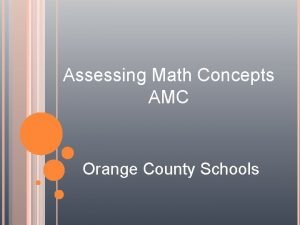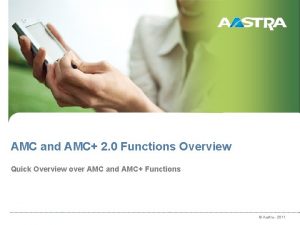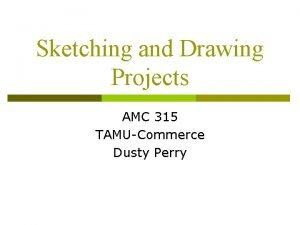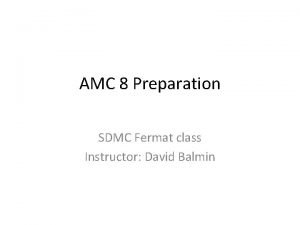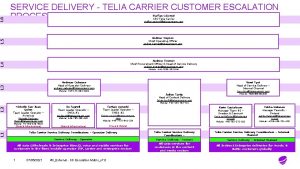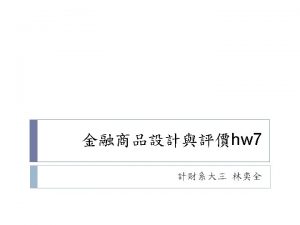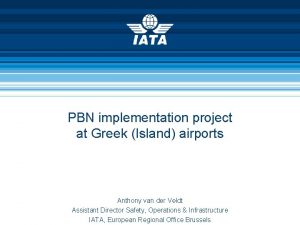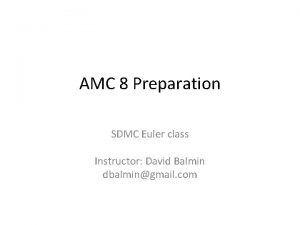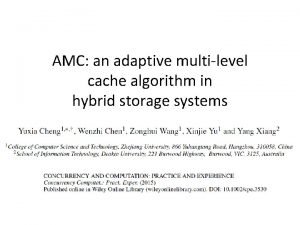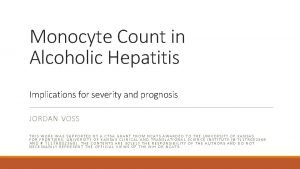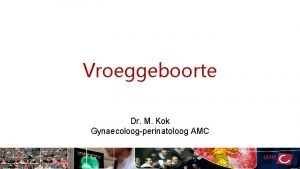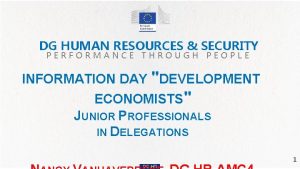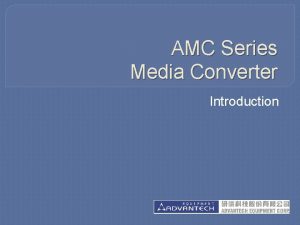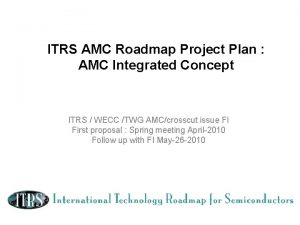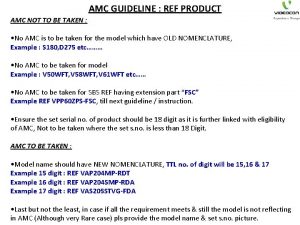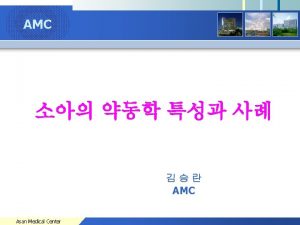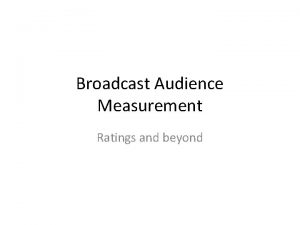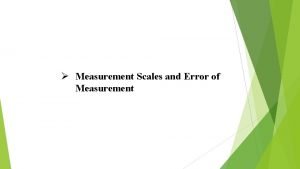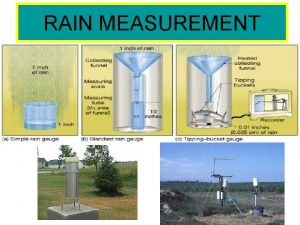Audience Measurement Coalition AMC Audience Measurement Coalition of















- Slides: 15

Audience Measurement Coalition (AMC) Audience Measurement Coalition of like-minded research companies and JICs AMC includes research organizations such as IVW, Me diame trie, Finnpanel, ATO, Spir, Nielsen, Kantar and Gemius POWERED BY DOTCOMMUNICATIONS

Audience Measurement Coalition (AMC): Brought together key companies and JICs (Joint Industry Committees) to advocate for a more lenient regime for audience measurement in the proposed e. Privacy Regulation. AMC represents the European audience measurement industries. Audience measurement covers: audiovisual measurement (e. g. in the context of AVMSD restrictions), web analytics, ad effectiveness and copyrights-related measurement Audience measurement is a statistical methodology to measure (online) audiences & their distribution across media, including the internet. Audience measurement is often referred to as “the currency of internet” and is essential to provide transparency to the market.

Audience Measurement Key points: Audience measurement (AM) allows to better understand our society & fosters competition by creating a level playing field AM sheds light into otherwise dark markets - its absence only benefits large, often global players to the detriment of SMEs AM is crucial for remunerating content owners, e. g. content sharing or royalties payments AM allows EU publishers compete with global (data) companies: provides one metrics across all platforms & allows better use of audiences that today are still fragmented AM supports EU’s AVMSD agenda: provides tools to achieve a level playing field.

New e. Privacy Regulation Proposal New e. Privacy Regulation: Comes on top of the recently adopted GDPR Introduces additional requirements, tightens the existing legal framework Objective: stop tracking or make it more difficult Audience measurement sector runs a high risk to become collateral damage in a battle aimed against online advertising

Key provisions of e. Privacy Regulation limiting audience measurement Art. 10 I: “Tech Mandate” - upon software installation (of e. g. browsers) users have to select privacy settings, of which one blocks storing and accessing of stored information by “third parties”. Art. 8 I: opt-in for the use of processing and storage capabilities (i. e. cookies and similar technologies) of devices and the collection of information (i. e. fingerprinting) from end-users’ devices. The proposal includes an exception for ‘web audience measuring’, but only applicable if carried out by the publisher itself, with his own means (e. g. only web analytics like Piwik). Art. 8 II: ‘Soft’ opt-in for the collection of information emitted (i. e. beacons, bluetooth, wifi) by devices to enable it to connect to another device and, or to network equipment.

AMC achieved – European Parliament Following intense debate the EU Parliament adopted a position that tightened the Commission's proposal in all points but security and audience measurement. EP text on audience measurement: Broadens applicability to audience / reach measurement (as supposed only to web analytics) Accepts the basic mechanism that purposes exempt from consent should not be blocked by the browser However, the inclusion of audience measurement in the exception from the browser settings was blocked by the Greens in the final vote: browser blockings remain challenging as exception requires the unhindered delivery of cookies / access to devices.

AMC achieved – Council Member States (MS) / Council The Council is delayed in comparison to the EP & takes time to deal with this file The Council has serious reservations over the text, especially the browser blocking provision, but most EU Member States (including Germany) have not yet a final position. AMC is proactive with Brussels outreach & several gatherings for AMC members were organized. AMC member met with many Telecom Attachées, Commission representatives and MEPs. Main sensitive issues in the Council concern: grounds for processing of metadata without consent (art. 6): many MS favouring introduction of a legitimate interest ground; storage & erasure of comms data (art. 7): several MS favour deletion due to overlap with the GDPR; protection of terminal equipment information ("cookie" art. 8); privacy settings ("browser settings" art. 10): several MS voicing strong concerns on its impact & effectiveness; data retention (art. 11), which has not been substantively dealt with due to discussions in DAPIX/Fo. P

Legislative process Procedural: The European Parliament (EP) has adopted it's position on e. Privacy in November 2017. Now the Council has to find its position & then adopt it in a so-called ”General Approach". Only once this is done, the Council will start negotiations with the EP to find a compromise. The compromise then will be subject for final approval in the EP & the Council. Despite the recent progress in the Council under the Bulgarian Presidency - thereby improved prospect of attaining a General Approach - there is a real risk of negotiations delaying as a result of insufficient meetings. It seems that Austria (taking over the rotating Presidency in July 2018) will move the file forward. Austria has a particular approach to privacy, but as a Presidency Austria would have to play a neutral role and be an honest broker.

EU Institutions Court of Justice Council Parliament Commission

10 How is EU Law made? Commission initiates & guides the legislative process Strong ability to influence Parliament has TWO readings to amend, adopt, reject Strong ability to influence Council has TWO readings to amend, adopt, reject Weak ability to influence Can’t agree then conciliation or bust!

New Reality in legislative lobbying Influencing EU law-making has never been so difficult Gone are the days of cozy relationships with a few Commission officials MEPs may be powerful but they are increasingly controlled by their Member State The Council’s advantage has grown

New response The earlier a deal can be done the better Increased importance for Commission DG, EP rapporteur(s), Council Presidency (the trilogue) Legislation still driven by limited number of players

AMC response Influential? To Won the TRUST of law makers! win trust AMC provides: timely, valuable, relevant and truthful information solutions not problems thought leadership and ability to cut deals & red tape understanding of process flexibility ability to form relevant coalitions (eg. with publishers, EGTA, EBU, Esomar, ACT)

Way forward Continue the outreach and complement Brussels actions at national level. Strong collaboration between JICs & companies is crucial to achieve an acceptable outcome for audience measurement. Activating people in the network to join common policy goals. Together we can prevent EU lawmakers from bad law making & throttling European digital business.

AMC secretariat Agata Nowacka, Director and owner at Dot. Communications Agata has 14 years’ experience in European affairs. Agata advises on the EU regulatory framework as well as on how to manage risk and enhance reputation among European legislators and stakeholders. She is a true EU insider with an excellent knowledge of institutional procedures and network. Before entering consulting, Agata worked as an adviser to S&D MEPs on the Committee on Industry, Research and Energy. She was responsible for ICT policies including negotiating in trilogues dossiers such as Roaming, Broadband, Spectrum, AVMSD, Telecoms Package, Net Neutrality as well as major energy and research related reports. Existing and previous clients include: Seznam. cz (number 1 search engine in Czech Republic), i. Cann, Audience Measurement Alliance (AMC), IAB Europe, Nielsen, Skype/Microsoft, e. Bay/Pay. Pal, Business Software Alliance, Disney, Apple, Facebook, Linked. In, Lenovo and AT&T.
